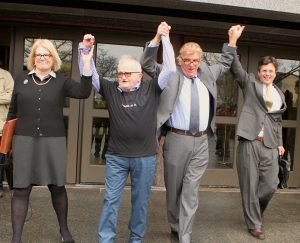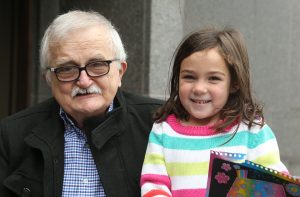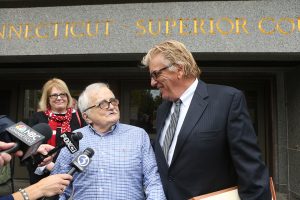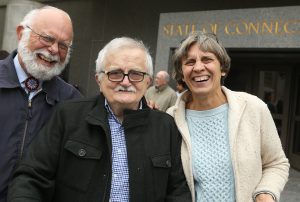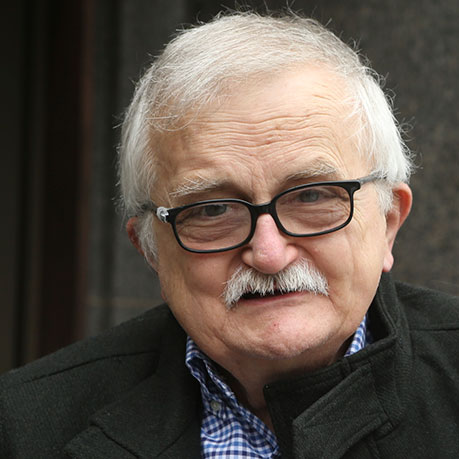
Richard Lapointe
Manchester, CT
Years served: 25 years, 9 months.
Charges: Capital felony, arson murder, felony murder, murder, arson in the first degree, assault in the first degree, sexual assault in the first degree, sexual assault in the third degree, kidnapping in the first degree.
Sentence: Life in prison plus sixty years, without possibility of release.
Factors contributing to wrongful conviction: Brady violation- failure to disclose exculpatory evidence; false confession; ineffective assistance of trial counsel; ineffective assistance of habeas counsel.
Date Freed: Released on bond April 10, 2015. Charges dismissed October 2, 2015
Richard Lapointe spent nearly 26 years wrongfully incarcerated for the death of his wife’s 88 year old grandmother, Bernice Martin in Manchester, CT, in 1987. He was the first on the scene of the crime where Bernice was found naked, bound, stabbed, strangled and sexually assaulted in her burning apartment. Richard is small of stature and suffers from a congenital brain condition affecting his cognitive ability, his balance and gait that would have made it difficult for him to commit the crimes.
The police elicited three different confessions from him during an elaborately staged, nine and a half hour interrogation on July 4, 1989. The details of his confessions did not agree with the facts of the crime scene, but Richard’s trial counsel did not use those differences at trial to impeach the confessions, nor did they call witnesses or hire fire experts who could have established the burn time of the fire in support of his alibi. The state suppressed the burn time estimate of their own fire experts, which also would have supported Richard’s alibi, and if shared would have led his attorneys to pursue a different defense strategy.
Richard’s case attracted a group of supporters who believed him innocent and unfairly targeted because of his disability. Centurion became aware of Richard’s case through his supporters and advised on the case for several years before taking over his post-conviction representation. Centurion worked for Richard for fifteen years, first amending his original petition for Writ of Habeas Corpus then filing a second habeas petition and numerous appeals to convince the courts that Richard was innocent and had been denied a fair trial. He was freed on bond April 10, 2015. The case was dismissed October 2, 2015, in response to the state’s acknowledgement that DNA analysis did not implicate him.
The full story…
The crime.
Bernice Martin was murdered in her Manchester, CT, apartment on March 8, 1987. She was bound, sexually assaulted, stabbed, strangled, and left to die in her apartment, where the perpetrator had set fire to the sofa and kitchen. Bernice was 88 years old.
Richard Lapointe, the mentally impaired husband of Bernice’s granddaughter, Karen Lapointe, (now Martin) discovered the fire and called first responders. The couple lived near Bernice with their 8-year old son. Bernice’s daughter, Nathalie Howard called Karen Martin that evening expressing concern for her mother who had not answered the phone when she called at 7:55 pm and again at 8:05 pm. Howard had last seen her mother, taking out the trash when she drove by at about 5:45 pm. Lapointe offered to check on her and to call her right back as soon as he knew everything was OK.
When Lapointe arrived at the apartment on foot, he knocked on the door, but Bernice Martin did not respond. He did not see any lights, so he went to the home of Jeannette King, a neighbor and called Howard to report that Bernice must already be asleep. Howard said that her mother never went to bed at that time and that she was coming over. Lapointe then called his wife, who told him to go back to the apartment and try to get in because the victim might have fallen and need help. He did, then returned, out of breath, to Jeannette King’s home saying that there was smoke coming from Bernice Martin’s apartment. He called 911 from King’s apartment at 8:27 pm.
Michael Tomkunas, an off-duty firefighter was the first on the scene, arriving within a few minutes of the 911 call. He immediately kicked in the door and tried to enter but the apartment was too hot and smoky. Other firefighters arrived almost immediately including Douglas Boland who ran to the back of the apartment and opened the sliding doors to cross ventilate the apartment, reducing the smoke and heat. The firefighters entered and discovered the victim lying naked on the floor six to eight feet from the burning sofa. She had one piece of fabric tied tightly around her neck and another around her midsection. The firefighters tried unsuccessfully to revive the victim. She was taken to the hospital where she was pronounced dead.
The investigation.
The autopsy revealed the cause of death to be asphyxia by strangulation from pressure to the right side of her neck with a blunt object as well as smoke inhalation. She suffered one, three-inch knife wound to the abdomen and ten less severe stab wounds to the back. She suffered extensive hemorrhaging, contusions and lacerations to the vaginal area which were caused not by intercourse but by a blunt object. She had first and second degree burns to various parts of her body.
Police collected several items from the crime scene; a pair of men’s gloves with the victim’s hair, a semen stain from the bedspread, a pubic hair from the victim’s blue sweater and button’s from the victim’s blouse that they found scattered on the floor in a way that suggested her clothing had been forcibly removed. They took photos of the clothing and other aspects of the crime scene. A pool of blood indicated that the victim was stabbed in bed. Police found a knife with melted plastic handle thought to be the weapon in the stabbing but no finger prints useful to the investigation remained on the knife or elsewhere in the apartment because of fire and water damage.
Early in the investigation Detective Michael Ludlow spoke with two state fire marshals, Joe Roy and Steve Igoe. Both were assisting with the case. He noted cryptically in his file that it was the marshals’ opinion that the minimum amount of time the fire could have burned before the first responders arrived was 30 – 40 minutes.
Detective Ludlow was put in charge of the investigation a few days after the crime. He remained in charge and the crime remained unsolved for over two years. When Detective Ludlow was promoted and transferred in March of 1989, Detective Paul Lombardo was put in charge. Lombardo focused on Richard Lapointe as his only suspect, despite the fact that earlier there had been two other suspects, both of whom had histories of violence and sexual assault.
DNA analysis was very new at that time, therefore the Connecticut Crime Lab used serology to blood type the semen stain found on the victim’s bedding. Analysis indicated the source was a person with blood type A, meaning they secrete blood type A in their bodily fluids. Roughly one third of the population are secretors with blood type A, including Richard Lapointe. Richard had had a vasectomy following the birth of his son, so his semen does not contain sperm. The pubic hair was microscopically compared to the victim’s pubic hair and to Richard Lapointe’s and was not similar to either. DNA analysis of the hair would not be performed until years later.
Detective Lombardo and his team made elaborate preparations for the interrogation of Richard Lapointe. They staged a room to look as if there was a task force to solve Bernice Martin’s homicide which had collected a great deal of evidence to implicate Richard. They hung a fictitious DNA chart on the wall indicating the semen stain found at the crime scene matched Richard. When they asked him to talk with them about Bernice’s murder at the police station, he agreed. Detectives interrogated Richard for nine and a half hours and elicited three different signed confessions. The first two confessions, one handwritten by Detective Lombardo and the other typed by him were very brief and vague. The first stated in part “…it was an accident. My mind went blank.” The second stated, “If the evidence shows that I was there, and that I killed her, then I killed her, but I don’t remember being there.” The third signed statement, which was hand written by Detective Morrissey after he had interviewed Karen Lapointe was the most detailed, however many of the details did not match the evidence collected at the crime scene.
Detective Lombardo had coordinated his interrogation of Richard at the police station with Detective Michael Morrissey’s interview of Karen at the couple’s home. Detective Morrissey wore a wire to record the interview without Karen’s knowledge. The team also coordinated tactics to deceive and threaten Richard and Karen and make both fearful that their young son would become a ward of the state if they said the wrong things. For example, Morrissey told Karen that Richard had a cut on his hand the day of the murder but in fact he did not. When Karen denied that Richard had a cut, Morrissey warned her that her son would be taken away from her for hindering prosecution. Despite these tactics, Karen did not change her story and her recall of events on the day of the crime provided a strong alibi for Richard.
Richard Lapointe’s arrest.
Despite having signed three confessions to the murder of Bernice Martin, the police allowed Richard Lapointe to leave the police station with his father-in-law and his brother-in-law who were waiting for him when the interrogation ended in the early morning hours of July 5, 1989. Richard went to work on July 5, and police arrested him at home after work later that day.
Richard Lapointe’s alibi.
On the day of the crime, Richard, his wife Karen, and their young son visited Bernice Martin at her apartment from about 2:00 to 4:00 in the afternoon. After the family returned home, Richard left again for about twenty minutes between 4:00 and 5:00 to walk their dog. The family had dinner together at 5:15 pm, and remained in each other’s sight except while Karen bathed their son from 6:15 or 6:30 pm until about 7:00 pm. Richard did not leave home again until Nathalie Howard called shortly after 8:00 pm, asking him to check on Bernice Martin, whom she had last seen alive, taking out her trash at 5:45 pm. Karen Lapointe corroborated Richard’s alibi when interviewed by Detective Morrissey. She testified to the same in a pre-trial hearing to suppress Richard’s confessions.
The trial.
Richard’s trial counsel, Death Penalty qualified Public Defenders Patrick Culligan and Christopher Cosgrove filed a pre-trial motion to suppress Richard’s confessions but Judge David M. Barry denied the motion on March 6, 1992. Testimony in the trial began on May 6, 1992, and the prosecution formed their case around Richard’s alleged confessions.
The defense argued that Richard’s disabilities caused by Dandy-Walker syndrome, made him vulnerable to the intimidation and deceitful tactics of the police who had elicited false confessions. Richard’s defense team did attempt to impeach Richard’s confessions by showing the jury how Richard’s confessions conflicted with the facts of the crime such as the clothing the victim was wearing when attacked, where in her home the victim was stabbed or the location of her stab wounds. They did not hire fire experts to establish their own timeline for the ignition and burn speed of the fire, which would have further supported Richard’s alibi. They did not call Richard’s then ex-wife to testify to his alibi. Instead, they relied on their cross-examination of Detective Morrissey about his interview with Karen to corroborate Richard’s alibi.
The jury found Richard guilty of capital felony, arson murder, felony murder, murder, arson in the first degree, assault in the first degree, sexual assault in the first degree, sexual assault in the third degree, kidnapping in the first degree. The prosecution sought the death penalty but the jury instead sentenced Richard to life imprisonment plus sixty years, without possibility of release.
Centurion’s involvement.
Centurion began advising Richard Lapointe and his team in the early 1990s. Centurion’s Kate Germond became concerned that the attorney Henry Theodore Vogt, representing Lapointe for his first petition for Writ of Habeas Corpus, was not presenting evidence to support the claims raised in the petition – actual innocence, prosecutorial misconduct and that trial counsel had been ineffective. Vogt had no prior experience in criminal or post-conviction law. On the second day of the hearing Germond called Paul Casteleiro who was a regular Centurion attorney and who was already apprised of the facts of the case and asked him to come to Hartford and intervene in the hearing. Paul did come but the judge allowed Vogt to finish the hearing, Paul was allowed to write a post hearing brief. Jim Cousins a Connecticut attorney who was also familiar with the case vouched for Paul’s Pro Hac Vice motion. The court ordered Vogt to turn over the entire case file to Casteleiro and while reviewing the file, Casteleiro discovered Detective Lombardo’s note from early in his investigation indicating Connecticut State Police fire inspectors had estimated the burn time for the fire to be 30 – 40 minutes and making it impossible for Richard Lapointe to have committed the crimes. The state had not shared Detective Lombardo’s note with Lapointe’s trial counsel and did not turn it over until 1999, after Vogt filed the first petition for habeas corpus.
In May of 2000, after Vogt presented his habeas brief, the Judge allowed Lapointe to replace Vogt with Casteleiro and Cousins who then sought permission to present additional evidence in the petition Vogt had filed. The judge would not however reopen the hearing or consider additional evidence. The Judge denied the petition on September 6, 2000. Casteleiro and Cousins filed but lost an appeal of the decision.
In 2002, the Centurion team filed a second petition for Writ of Habeas Corpus alleging ineffective counsel at trial and ineffective representation in the first habeas petition by Vogt. The case finally made it to trial in July of 2007. On August 2, 2007, the judge issued a written decision for the state dismissing the second habeas corpus petition. Over the next several years, Centurion’s team continued to advocate for Richard Lapointe in different courts saying the courts erred in deciding that Detective Lombardo’s note estimating the burn time of the fire was not exculpatory or not material to the conviction, and that Richard’s counsel at trial and in his first habeas petition were ineffective.
In May of 2009, The Connecticut Appellate Court decided that Judge Fuger erred when he dismissed the claims of ineffective counsel at trial and that exculpatory evidence was suppressed by the state. The state prevailed in challenging that decision. On October 9, 2012, Judge J. Nazzaro said that the claim of actual innocence was not proven but agreed with Centurion’s argument for Richard Lapointe that the state had deprived Lapointe of a fair trial by suppressing material evidence and that he “was prejudiced by his prior habeas counsel’s failure to pursue that issue at the first habeas proceeding.” He ordered a new trial. The state appealed that decision and on March 13, 2015, Judges Rogers, Eveleigh and Rogers affirmed Nazzaro’s order for a new trial saying, “We agree with the petitioner both that he was deprived of a fair trial because his rights under Brady were violated and that his first habeas counsel’s representation was constitutionally deficient in that counsel failed to establish that violation”.
On April 15, 2015, Richard Lapointe was released on $250,000 bond and a 7am to 7pm curfew. On October 2, 2015, stating that new DNA testing did not implicate Richard and that they did not have enough evidence to try the case again. Judge Joan Alexander dismissed the case. Richard was freed!


